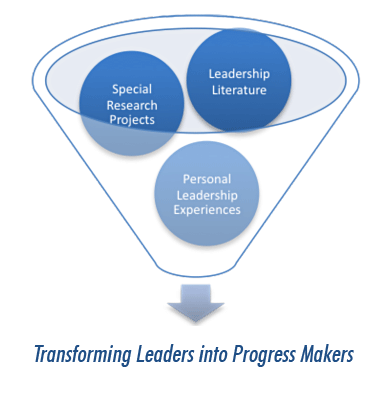Transforming Leaders into
PROGRESSMAKERS
Leadership for the 21st Century
Phillip G. Clampitt, Hendrickson Professor of Business, University of Wisconsin -- Green Bay
Robert J. DeKoch, President & COO, The Boldt Company
Media
H.R. McMaster Profile
Research Highlights
The Progress Model and strategies we highlight in the book emerged from a synthesis of three different “pools of insight”: 1) leadership literature, 2) reflections on our personal leadership experiences, and 3) special research projects developed for this book. Numerous ideas worthy of discussion flowed from the pools of insight. We then filtered out the redundant and inconsequential, channeling the remaining into seven essential insights that form the basis for the second section of Progress Makers.
Two particular research studies deserve special mention: 1) uncertainty management, and 2) error management.

Uncertainty Management Study
1. Employees who work for organizations that embrace uncertainty tend to be:
-
more satisfied with their job
-
more committed to their organizations
-
more likely to identify with the organization
-
less cynical about organizational life
These tendencies occurred even when employees themselves did not fully embrace uncertainty.
2. Almost 65% of employees in the non-profit sector believe that they work in an organizational climate that suppresses uncertainty.
3. Almost 60% of employees in the information and technology sector believe they work in an organization that embraces uncertainty.
4. The number one ranked method organizations use to do a better job of embracing uncertainty was to "improve their communication practices.”
5. Over 50% of non-management employees believe that they work in an organizational climate that suppresses uncertainty, compared to 42% of employees in top management positions.
6. The age of employees does NOT appear to be related to their ability to embrace uncertainty.
7. Organizations that embrace uncertainty have three basic competencies: 1) they cultivate awareness of uncertainty, 2) they communicate about uncertainty, and 3) they catalyze action during uncertain times.
Note: These findings were based on a "snowball" sample of over 1,000 employees randomly selected from companies ranging from small businesses to Fortune 500 companies.
Error Management Study
1. The three most frequent types of errors organizations recognize are:
-
Customer service (rank 1)
-
Quality of product or service (2)
-
Hiring decisions (3)
2. The three least frequent types of errors organizations recognize are:
-
Personnel promotions (rank 15)
-
Management of change (16)
-
Management of information (17)
3. There is a wide gap between the error management practices of well-led and less well-led organizations. Well-led organizations tend to promote more learning from errors than their counterparts.
Do Organizations Learn from Their Errors?
